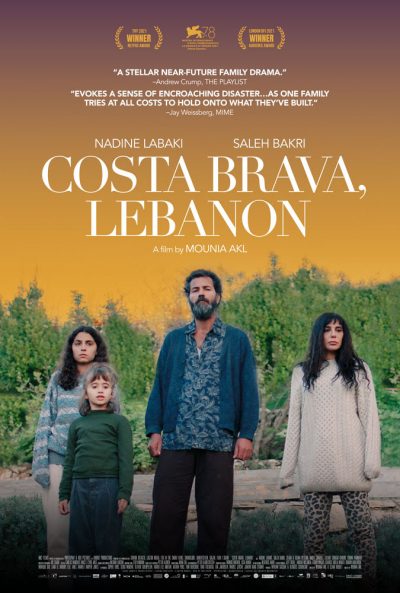
“Costa Brava, Lebanon” (2021 production, 2022 release). Cast: Saleh Bakri, Nadine Labaki, Ceana Restom, Geana Restom, Nadia Charbel, Liliane Chacar Khoury, François Nour, Yumna Marwan, Mehyeddine El Karra, Dimitri Saba. Director: Mounia Akl. Screenplay: Mounia Akl and Clara Roquet. Web site. Trailer.
Staying engaged with the pulse of life is arguably the best way to get the most out of our existence. However, there are times when the pressures of everyday living can wear on us, making us feel as though we have to get away, especially if we believe that it’s placing our health, sanity and well-being in jeopardy. Retreating from such conditions can be rejuvenating and put us on a happier and more fulfilling path. But such isolation also has the potential to become a trap, despite the ostensibly pleasant circumstances associated with it, a conundrum examined in the new domestic/ecological drama, “Costa Brava, Lebanon.”
For the free-spirited Badri family, they saw the handwriting on the wall before any of these developments emerged. They tired of the increasingly difficult way of life in Beirut with its increasingly toxic pollution and social unrest. So, to escape these conditions, they decided to pick up stakes and move to a remote mountain sanctuary that they painstakingly created themselves. Over the course of a decade, they gradually built what they came to see as their own little utopian paradise, one premised on sustainable living, healthy environmental conditions and freedom from the stresses of the urban lifestyle.
Spearheading this effort were activist Walid Badri (Saleh Bakri) and his wife, famed musician Souraya Marwan (Nadine Labaki), who met during the many political protests Lebanon experienced years earlier. They eventually married and had a daughter, Tala (Nadia Charbal). However, after years of struggling with the difficulties in life in Beirut, they decided to begin anew in the wilderness. They relocated with Walid’s mother, Zeina (Liliane Chacar Khoury), and, once settled, gave birth to a second daughter, Reem (Ceana Restom, Geana Restom), eight years younger than her sister. While Tala had had some experience with urban living, Reem was exclusively a child of nature. And Zeina, though glad to have a roof over her head and caretakers at her disposal, never fully embraced the neo-hippie lifestyle, accepting it begrudgingly and definitely missing some of the ways of city life.
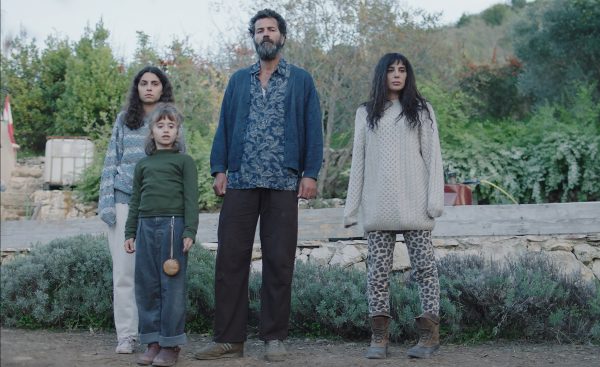
Despite these differences in experience and outlook, the five family members have spent the past 10 years making a new life for themselves. But, just as they have come to believe that this existence has finally and firmly become established, a huge new wrinkle has emerged: The government has begun work on building an enormous, supposedly green landfill and recycling center, a complex that borders directly on the Badris’ doorstep. It’s opened with much fanfare, including a nationally televised speech by the Lebanese president (Dimitri Saba) and the arrival of a glad-handing manager, Tarek (François Nour), whose presence is intended to help establish good relations with the facility’s neighbors.
However, the family is anything but pleased. To begin with, no prior notification of the construction appears to have been provided. But, perhaps more importantly, they don’t believe the government’s claims that the facility will indeed be environmentally friendly, given its longstanding track record to the contrary. Officials contend that, because the center is being built with international financial backing, it must comply with green management practices, but, as the family soon discovers, those promises ring hollow. Trash that’s supposed to be processed for recycling is simply buried as is, and garbage that’s supposed to be buried is burned to make room for greater volumes of waste, sending ash in the direction of the Badris’ property.
The family is outraged, to say the least, but they each react differently to these developments, threatening to tear the household apart. Ever the activist, Walid, who has a reputation for being a loose cannon, seeks to file lawsuits against authorities, though it quickly becomes apparent that these initiatives are destined to go nowhere, further fueling his temper and his obsessive behavior. Harmony within the household is quickly jeopardized, especially in his relations with Souraya, who urges Walid to take a more realistic, less isolationist view of their circumstances. Meanwhile, the sisters become divisive in their support of their parents, especially when Tala’s adolescent curiosity veers into areas that draw varying degrees of disapproval from virtually everyone, but most notably her father. And Zeina, whose age is beginning to get the better of her, grows increasingly complacent about the landfill situation and shows more concern about being able to obtain a travel visa to visit her daughter, Alia (Yumna Marwan), Walid’s younger sister who has been working as a financier in Colombia for the past 15 years.
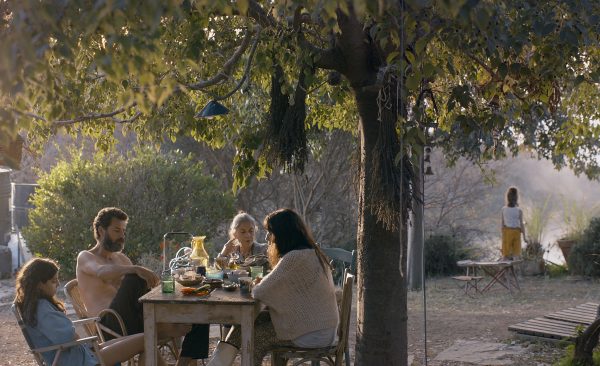
This scenario thus serves as a microcosm of what’s been happening in Lebanon’s citizenry at large – the discrepancy in attitudes between those who want to remain actively involved in the nation’s everyday life and those who want to retreat into obscurity and be left alone. Who will win out? And what impact will it have for both the country’s environmental status and its social cohesion? That remains to be seen, both for the family and the population in general. It’s a precarious position for both entities to be in – and one that carries serious implications for each.
The Badris are certainly to be commended for taking a chance in intentionally going off the grid. They’re committed to living out their idealism, something most of us only dream about but never act upon. And they set an example for the rest of us to follow, whether it’s figuring out how to make sustainable living work or to just muster up the courage, commitment and conviction to successfully pursue a cherished goal. Those kinds of affirming beliefs are certainly laudable and worth emulating.
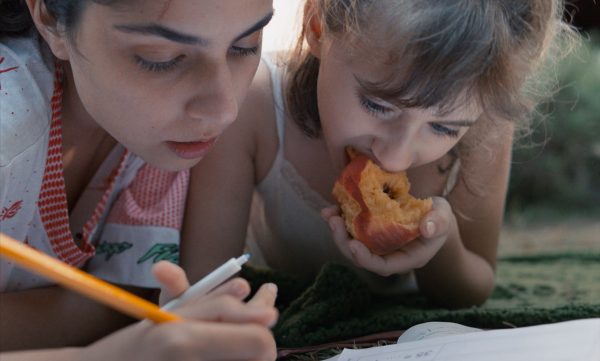
But at what point do they become hallmarks of obsessive, potentially impractical behavior? For years, Walid has endeavored to create an environment for his family to help them thrive without the hindrances of stressful urban living, a noble pursuit, to be sure. He’s been especially diligent about this where it comes to his daughters’ development, teaching them honorable values and giving them the freedom to create what they will. However, these virtues have come at a cost by coercing them to function within the restrictions of this alternative lifestyle, one that gives them little appreciation of or exposure to the wider outside world. The allegedly protective shell he’s built for them has, in its own way, become a sort of naïvely idealistic cage, one whose bars have become ever more reinforced with the encroaching intrusion being erected next door. The landfill is thus symbolic of the world at large seeking to burst the bubble and bring itself into the lives of the family, something that all of them (but especially Tala and Reem) will need to know how to deal with if they hope to survive in the greater existence of which they’re a part.
The more Walid tries to keep the outside world at bay, the more strain it places on the household. His idealistic beliefs are thus starting to reveal their innate shortcomings, aspects that could undermine the harmonious paradise that they were designed to manifest. Indeed, when someone becomes so fixated on the purity of his or her principles to the detriment of everyday practicality, impending trouble becomes a real possibility.
The presence of the landfill is undoubtedly a genuine nuisance, especially given the circumstances under which the facility has been constructed and operated. However, it has its purpose. Perhaps it’s to help keep the idealists grounded, to help keep them from losing sight of the conditions of the wider reality. Perhaps it’s to reinforce the family’s idealism, prompting them to engage in activism aimed at pointing out and subsequently overcoming the problems of such institutions. Or perhaps it’s intended to help the family address long-simmering issues that have been quietly overlooked and have finally reached a boiling point. Any or all of these scenarios could be plausible, but whatever the actual purpose might be, its very existence proves that it’s something not to be ignored. In this story, it’s something that the family needs to examine and deal with if they hope to preserve paradise going forward, no matter what form it may take.
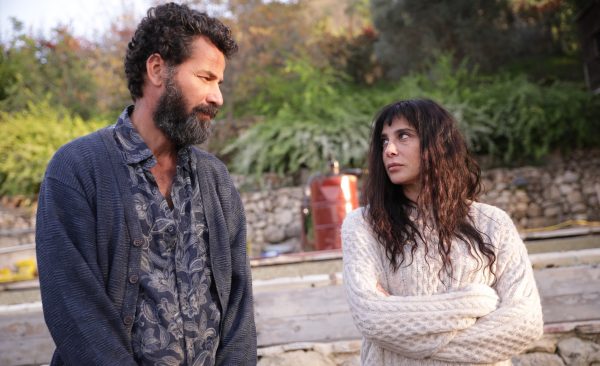
With society collapsing around us financially, ethically and environmentally, there may be a strong desire among some of us to escape these conditions in an attempt to find hope, health and happiness in an idyllic sanctuary, one free of negative influences and built on principles of fairness, freedom, creativity and sustainability. But is such an idealistic exodus truly realistic, especially when the world’s ills are still capable of intruding on such a utopia? And how will such an imposition affect those well-meaning social refugees? Will they be able to cope, or will they collapse under the weight of their own inflexible idealism?
Those are the questions raised in this domestic/ecological drama, the second feature offering from director Mounia Akl. Set in the near future but based on the issues of Lebanon’s recent past, the film provides prime examples of “out of sight, out of mind” solutions on both sides of this issue, game plans that ultimately have their own inherent strengths and weaknesses. It’s truly illuminating in its depiction of the parallels between what’s going on in the household and what’s happening next door, though sometimes their subdued treatment makes them feel somewhat underdeveloped and not entirely clear, particularly in the picture’s occasional satirical and surrealistic sequences. Nevertheless, the filmmaker’s attempt to serve up a distinctly different type of story with sublimely engaging psychological and sociological aspects makes for a noteworthy cinematic experiment, one that will likely appeal to those with eclectic sensibilities. And who said trash couldn’t be interesting?
The picture has been a favorite on the film festival circuit, winning a number of awards, and had a brief theatrical run. It’s now available for streaming online.
Copyright © 2022, by Brent Marchant. All rights reserved.

No comments:
Post a Comment